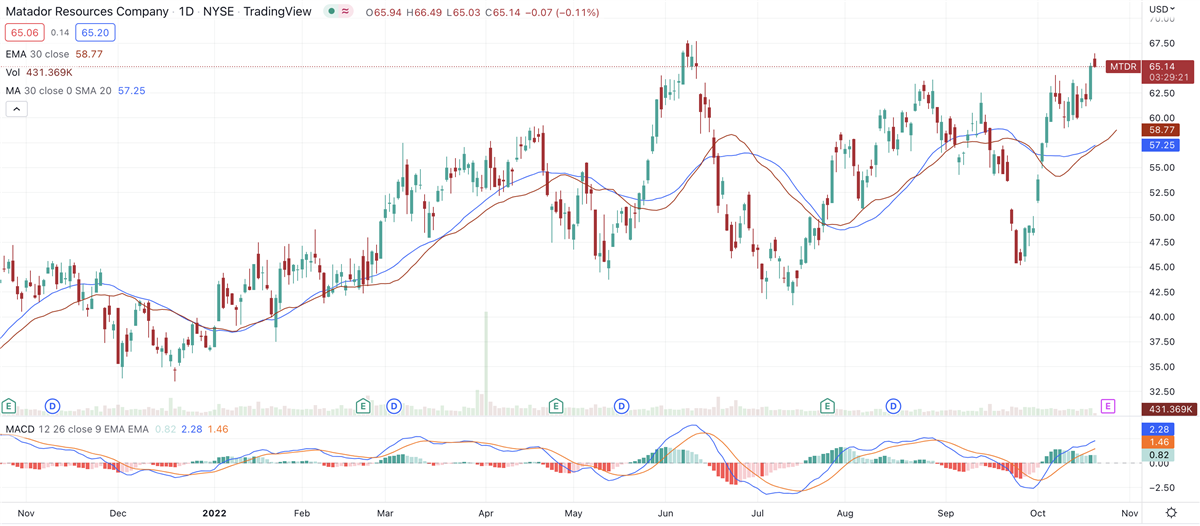 Energy-sector strength was on display Thursday as oil-and-gas explorer Matador Resources (NYSE: MTDR) was trading within 3% of its June 8 high of $67.78.
Energy-sector strength was on display Thursday as oil-and-gas explorer Matador Resources (NYSE: MTDR) was trading within 3% of its June 8 high of $67.78.The Dallas-based mid-cap reports its third quarter on October 25, with analysts anticipating earnings of $2.53 a share on revenue of $766.17 million. That would be a little over double earnings in the year-ago quarter and a 62% increase in revenue.
According to MarketBeat earnings data on Matador, the company has beaten bottom-line views in every quarter since the second quarter of 2017, when it met expectations. Matador has missed revenue views recently, including the quarter that ended in March of this year.
For the full year, analysts expect Matador to earn $10.74 per share, which would be a gain of 153% over 2021. That’s seen sliding by 7% next year, to $9.97 per share.
The stock cleared a cup-with-handle buy point above $58.58 on August 11 but chopped around since then as the broader market downtrend steepened. 
Matador is a component of the S&P 400 mid-cap index, tracked by the SPDR S&P MidCap 400 ETF (NYSEARCA: MDY). Not surprisingly for an energy stock, Matador is outperforming its index. In fact, you could say Matador is trouncing the S&P 400 performance.
The index is down 21.71% year-to-date, while Matador has posted a gain of 77.17%. Matador is up 15.74% in the past month and up 36.32% in the past three months.
Of course, a big part of Matador’s outperformance is due to companies throughout the sector fetching higher prices. In addition, energy stocks were undervalued going into the 2021 sector-wide rally.
Credit-Rating Upgrade
Matador has some company-specific developments that make it attractive to investors. In September, Matador announced that bond rater Fitch upgraded its credit rating from ‘B+’ to ‘BB-’.
In an October 4 news release, Fitch said, “The upgrade reflects the company’s production growth momentum, management’s continued commitment to a conservative financial policy, and significant gross debt reduction, which has materially improved credit metrics.”
Fitch categorizes its BB ratings as speculative. In an explanation on its Web site, Fitch says, “BB ratings indicate an elevated vulnerability to default risk, particularly in the event of adverse changes in business or economic conditions over time; however, business or financial flexibility exists that supports the servicing of financial commitments.”
In other words, Fitch views Matador’s credit quality as somewhat tenuous, due to business or economic risk, but it sees the company as able to service its debt.Matador Repurchasing Its Bonds
In addition, in September, Matador used a portion of its free cash flow to repurchase $105 million of its outstanding debt in the open market. That reduced outstanding bonds from $862 million on September 12 to $757 million at the end of the quarter.
“Over the past seven quarters, beginning in the fourth quarter of 2020, Matador has reduced its outstanding debt by $768 million or just over half of Matador’s then total revolving debt and senior notes outstanding,” the company said, in a news release.
So why is any of that important to equity investors? It’s true that retail investors often use price-and-volume chart metrics to determine whether a stock is a buy, and that’s certainly a valid way to make short-term trades or swing trades.
But institutional investors, who generally have a longer time horizon, dig into metrics such as debt. It’s pretty intuitive that a heavy debt burden can inhibit a company’s ability to launch new projects, or even lead to insolvency.
Slashing debt is a move institutional investors typically reward with increased buying. Although the entire move can’t be attributed to a higher credit rating and lower debt, Matador shares are up 21% since the October 4 news release.
Matador has a beta of 1.28, meaning it’s more volatile than the broader market, using the large-cap S&P 500 as a proxy. That’s not exactly the best proxy, as mid-caps tend to be more volatile than larger peers. However, it gives you some context for Matador’s price moves, when compared against large-cap industry names, such as EOG Resources (NYSE: EOG), Pioneer Natural Resources (NYSE: PXD) and Devon Energy (NYSE: DVN), all of which have lower betas than Matador.













